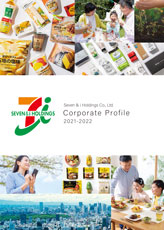- Top
- Sustainability
- Seven & i Holdings Material Issues
- Material Issues 3
- Supply Chain Management (Environment)
- Sustainability
- Message from the Representative Director & Executive Chair (Kaicho)
- Basic Policies of Sustainability Initiatives
- Sustainability Management
- Stakeholder Engagement
- Business Partners
- Seven & i Holdings Material Issues
- Corporate Governance
- Compliance
- Information Security and Personal Information Protection
- Human Rights Initiatives
- Human Capital Initiatives
- Climate and Nature-related Information Disclosures —Responses to TCFD/TNFD Recommendations
- Social Contribution Activities
- Business Continuity Initiatives
- Overseas Initiatives
- Sustainability Data Book
- External Recognition and Awards
- SASB/GRI Index
- Index for Researchers
- Keyword search
- Editorial Policy
- Social
- Environment
Supply Chain Management (Environment)
Seven & i Holdings Co., Ltd. and its consolidated subsidiaries (hereinafter referred to as "our Group") are making efforts to reduce its own environmental impact as well as working together with its business partners to reduce environmental impact across the entire supply chain. Besides requesting that our contractors that are manufacturing original products to comply with the Business Partner Sustainable Action Guidelines, we are also working to save energy at factories and introduce eco-friendly vehicles.
Applying the Business Partner Sustainable Action Guidelines
To ensure that it meets its social responsibilities on matters such as reducing its impact on the environment, Seven & i Holdings formulated the Business Partner Action Guidelines in 2007 and asks business partners to comply with them. In December 2019, to clarify our intention to build a sustainable society together with our business partners, we enhanced items related to human rights and labor issues. Thus we changed the name of the guidelines to “Seven & i Holdings Business Partner Sustainable Action Guidelines.”
“8. Global Environmental Conservation” in the Seven & i Holdings Business Partner Sustainable Action Guidelines defines items such as compliance with environmental laws and regulations, appropriate handling of wastewater and waste, consideration of biodiversity, and proactive use of energy-efficient equipment and eco-friendly technologies, as well as items related to the “GREEN CHALLENGE 2050” environmental declaration.
For our business partners to understand these guidelines for sustainable behavior and take effective action, we are carrying out the following activities, which are primarily aimed at the original products manufactured by the Group companies. In the fiscal year ending February 29, 2020, due to the global spread of COVID-19, we cancelled the on-site briefing sessions on the Seven & i Holdings Business Partner Sustainable Action Guidelines and CSR audits, but from June 2020 we began explaining the Seven & i Holdings Business Partner Sustainable Action Guidelines to business partners with overseas production bases via on-demand distribution, and encouraged them to put them into practice. In addition, from August 2020, we made it possible to view materials in Chinese and five other Asian languages, and from October, we began distributing videos explaining CSR audits with Chinese narration for our business partners in China. In fiscal 2024, we held explanatory meetings on the Seven & i Holdings Business Partner Sustainable Action Guidelines and CSR audits, which were broadcast live and on demand, and 642 people from 396 companies watched the live broadcast. In addition, 953 people watched the recording, and 4,700 people viewed the explanatory meeting materials.
◆Awareness and spread: Organizing of briefings
◆Confirmation of implementation: Administering of self-check sheet
◆Support for implementation: Organizing of compliance training
◆Validation of implementation: Conduct of CSR audits and encouraging the taking of corrective action
In March 2025, we also revised the Sustainable Action Guidelines for Business Partners in response to various environmental changes. The updates specifically focus on further strengthening respect for human rights and occupational health and safety, aligning them with international standards. We are communicating these changes to our business partners through informational sessions.
CSR Audits and Corrective Measures
Since the fiscal year ended February 28, 2013, our Group has had CSR audits conducted by third-party inspections organizations at the manufacturing factories of our private brand suppliers in developing countries. The CSR audits include everything from items related to human rights and labor issues to inspections of environmental aspects, such as compliance with environmental laws and regulations, management of effluent and chemical substances, and promotion of energy-saving and environmental protection activities.
If the business partner is found to be in conformance upon completion of the audit, we issue a Certificate of Conformity. However, if items not in conformance with the audit items (nonconforming items) are found, the third-party auditing organization will indicate the nonconforming items to the business partner in question. If the audit finds items that do not comply with the audit program (unacceptable items), the external audit organization provides guidance to the business partner concerned. The business partners must submit a corrective action plan (CAP) to the auditing organization within 10 days of the audit being completed, and must take immediate action to improve the items. After receiving a report on the completion of improvements for the relevant items, the completion of improvements is confirmed based on the submission of photos showing the improvements, guarantee documents (evidence) and other materials. However, for factories that exceed certain standards, such as when numerous serious unacceptable items are found, the resolution of issues is confirmed through another visit to perform a re-audit. When correction of the non-compliant items is completed or the third-party auditing organization and Seven & i Holdings judge that the plan contained in the CAP is valid, a Certificate of Conformity is issued to the relevant business partner.
The issuance of a “Certificate of Conformity” is a prerequisite for a business relationship to continue. In addition, when a new transaction is requested, we ask that you understand and comply with the “Seven & i Holdings Business Partner Sustainable Action Guidelines” and begin the transaction after a “Certificate of Conformity” has been issued through a CSR audit.
Promoting Environmental Information Management at Manufacturing Factories
Seven-Eleven Japan has its original daily products manufactured by several contract manufacturers. These manufacturers have organized the Nihon Delica Foods Association, which reports on the CO2 emissions, waste emissions, and the food recycle rate. It works to ascertain the environmental information of our contract manufacturers and hold study seminars through the “Environmental Promotion Team” (held monthly) under the CSR Promotion Committee of the Nihon Delica Foods Association, where it shares and spread examples from each manufacturer.
221 factories in Japan that are tasked with manufacturing the Group's “Seven Premium” private brand products have acquired ISO 14001 certification for their environmental management systems.
Scope 3*1 Calculation
Seven & i Holdings is working to reduce CO2 emissions and evaluate its environmental impact at every stage from the supply chain through to sales and consumption, as stated in its Fundamental Policies Relating to Measures to Contribute to the Prevention of Global Warming. To this end, the Group has calculated the CO2 emissions (“Scope 3”) throughout the entire supply chain following the “Basic Guidelines on Accounting for Greenhouse Gas Emissions throughout the Supply Chain Ver. 2.4.” of the Ministry of the Environment. For the fiscal year ending February 28, 2025, we calculated emissions for 9 major Group companies.*2 Our Group supports the comfortable lives of its customers. On the other hand, some aspects place a burden on the environment. We will actively work to expand the supply of renewable fuels and the installation of EV chargers. 7-Eleven, Inc., which sells gasoline, is advancing a sustainable future through targeted priorities, including increased access to alternative fuels, an overall reduction in CO2e emissions and a continued investment in renewable energy.
- 1. “Scope 3”: CO2 emissions other than those from the company, emitted from its procurement of raw materials and products, transportation, and product use, together with CO2 emissions from waste disposal processes
- 2. The following 9 companies: Seven-Eleven Japan, 7-Eleven, Inc., Ito-Yokado, York-Benimaru, SHELL GARDEN, Akachan Honpo, THE LOFT, Denny's Japan, and Seven Bank
Breakdown of Greenhouse Gas Emissions throughout the Supply Chain in the Fiscal Year Ending February 28, 2025 (Totals for 9 companies)
| Categories |
Amount of emissions (t-CO2) |
Composition ratio (%) |
|---|---|---|
| Category 1 (Purchased goods and services) | 48,326,521 | 28.3% |
| Category 2 (Capital goods) | 621,710 | 0.4% |
| Category 3 (Fuel- and-energy-related activities not included in Scope 1 or 2) | 521,449 | 0.3% |
| Category 4 (Upstream transportation and distribution) | 589,864 | 0.5% |
| Category 5 (Waste generated in operations) | 653,785 | 0.3% |
| Category 6 (Business travel) | 18,997 | 0.01% |
| Category 7 (Employee commuting) | 170,910 | 0.1% |
| Category 8 (Upstream leased assets) | - | - |
| Category 9 (Downstream transportation and distribution) | 101,802 | 0.1% |
| Category 10 (Processing of sold products) | - | - |
| Category 11 (Use of sold products) | 113,569,594 | 66.4% |
| Category 12 (End of life treatment of sold products) | 417,106 | 0.2% |
| Category 13 (Downstream leased assets) | 92,354 | 0.1% |
| Category 14 (Franchises) | 75,075 | 0.04% |
| Category 15 (Investments) | 5,764,114 | 3.4% |
| Total of Scopes 3 | 170,923,281 | 100.0% |
Reducing CO2 Emissions from Deliveries
Seven & i Holdings is asking its partners who deliver products to stores to cooperate with efforts to introduce eco-friendly vehicles, improve fuel efficiency, and reduce store delivery frequencies. Furthermore, progress is also being made in fitting trucks with drive-data terminals that record driving status. Data collected from the terminals is used to provide driver instruction and eco-driving seminars.
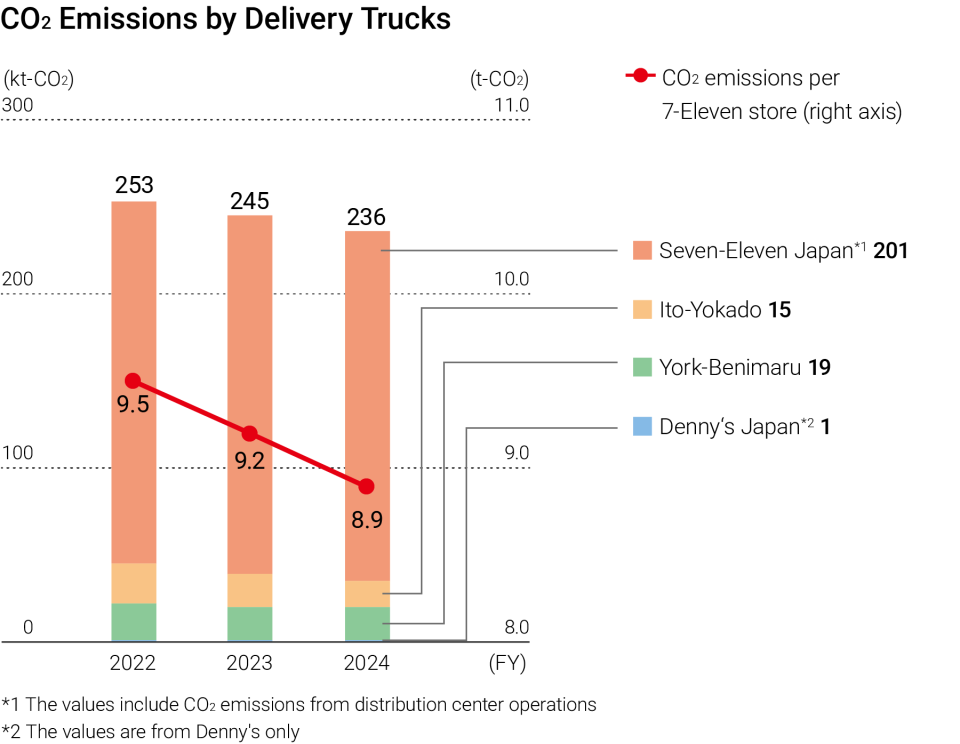
Introduction of Eco-Friendly Vehicles (Seven-Eleven Japan)
For its delivery vehicles that convey products to stores, Seven-Eleven Japan is introducing clean diesel engines, compressed natural gas (CNG), hybrid vehicles, and EV trucks and hydrogen-powered fuel cell trucks that do not emit CO2, with the goal of reducingCO2 emissions to achieve a decarbonized society.
In March 2018, Seven-Eleven Japan introduced three EV trucks from Mitsubishi Fuso Truck and Bus Corporation, with the scope for introduction of EV trucks currently being further expanded for store deliveries.
Additionally, in April 2019, it introduced two light fuel cell trucks developed by Toyota Motor Corporation. These trucks run on a fuel cell (FC unit) that uses hydrogen to generate electricity, has a maximum loading capacity of three tons, a cruising range of approximately 200 kilometers, and does not emit environmentally hazardous substances during operation. Also, the electricity generated by the FC unit is used to power the refrigeration unit. As of 2024, four small fuel cell trucks are in operation in Tokyo and Fukushima Prefecture.
| FY2021 | FY2022 |
FY2023 |
FY2024 |
|---|---|---|---|
| 4,424 (out of 6,208) | 4,860 (out of 6,169) | 5,688 (out of 6,205) | 6,084 (out of 6,283) |
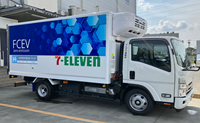
Small fuel cell truck
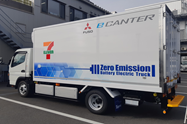
EV truck
Delivery Using Biofuel
A recycling scheme that refines used cooking oil collected from 7-Eleven stores and factories that manufacture boxed lunches and delicatessen items to produce biofuel for use in some delivery vehicles that operate within the city has been implemented in Matsuyama City, Ehime Prefecture since 2018.
Also, since December 2024, we have begun to use biofuel produced from used cooking oil collected from school cafeterias, households, and private businesses in collaboration with nine neighboring municipalities centered on Ushiku City, Ibaraki Prefecture in some vehicles that make deliveries to 7-Eleven stores in and around the city. This initiative uses diesel fuel blended with 5% biodiesel fuel made from plant-based used cooking oil. Since plants absorb CO2 during the growth process, this biodiesel fuel results in net zero CO2 emissions in conjunction with use.
In addition, we have been conducting a demonstration test with Mitsui & Co., Ltd. since 2024 to use 100% biodiesel fuel at a joint distribution center (Frozen Kobe Center) in Hyogo Prefecture. This demonstration test uses fuel refined from plant-based cooking oil collected from 7-Eleven stores in Osaka and Kyoto Prefectures, and since it is 100% biodiesel fuel, it is expected to reduce CO2 emissions by 2.6 kg/L compared to regular diesel fuel.
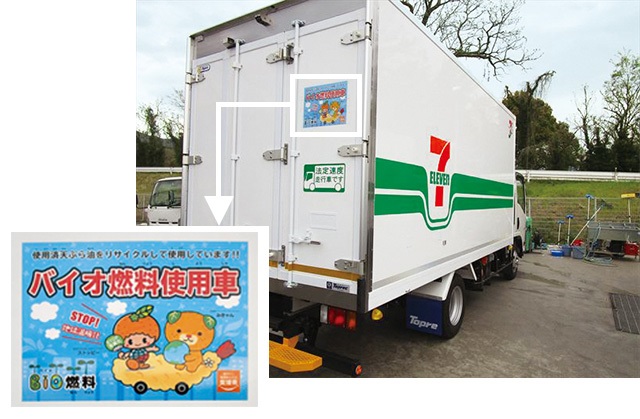
Delivery vehicle that runs on biodiesel fuel
Introduction of Eco-Friendly Vehicles (York-Benimaru)
In February 2023, York-Benimaru commenced deliveries to its stores utilizing “small hydrogen fuel cell trucks.” Going forward, retail, logistics, infrastructure, and vehicle manufacturers will actively work together on managing operations for hydrogen fuel cell trucks and on building energy management systems (creation of optimum hydrogen station operations). As of the end of February 2025, two vehicles were in operation in Koriyama City.
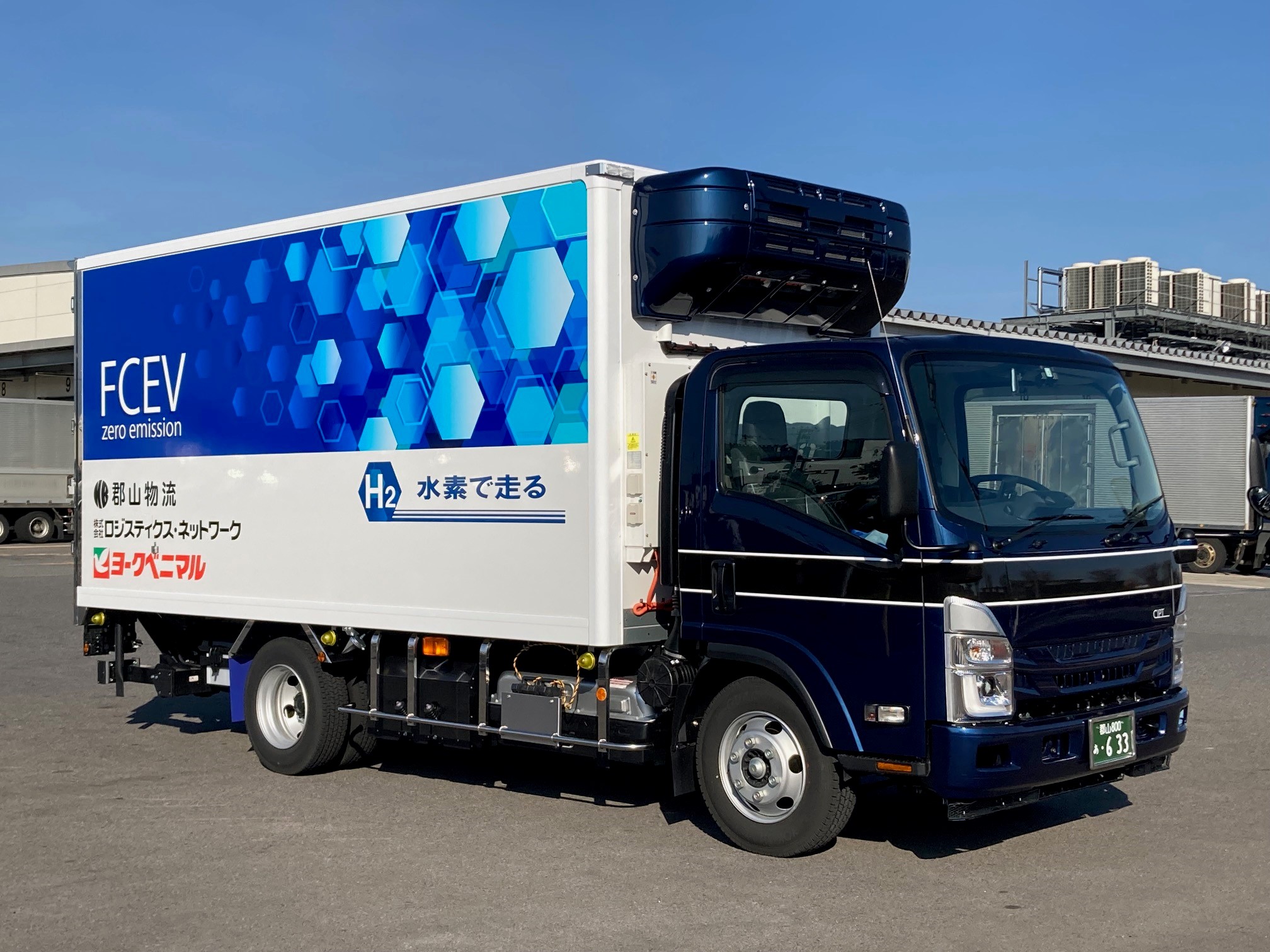
Small hydrogen fuel cell truck
Promoting Introduction of Eco-Friendly Tires
Seven-Eleven Japan is promoting the introduction of eco-friendly tires with low rolling resistance for delivery vehicles. As of the end of February 2025, it have installed ecofriendly tires on approximately 99% of the total fleet.
Moreover, Seven-Eleven Japan has also introduced retread tires. These tires are made from tires that have finished their service life, by removing a certain amount of the rubber surface that makes contact with the road and applying new rubber and tread. In this way, they can be re-used as rear tires for delivery vehicles. Seven-Eleven Japan will promote the use of retread tires to contribute to resource conservation and waste reduction by reusing them.
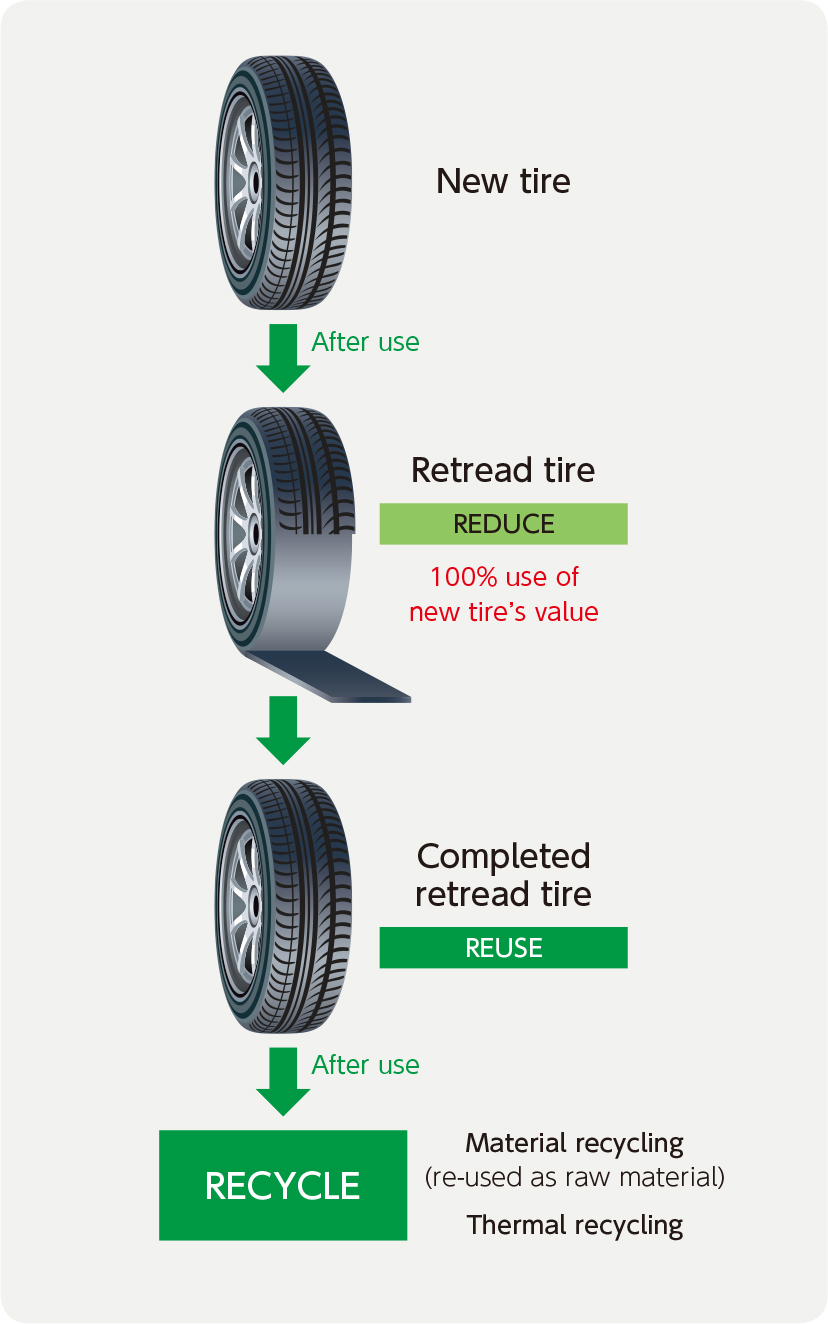
Retread tires
Introduction of Energy-Saving Equipment at Distribution Centers
Seven-Eleven Japan is promoting efforts to reduce wasteful power usage at its distribution centers, which deliver products to 7-Eleven stores, by introducing “demand controllers” that monitor the electricity usage of each unit of equipment and apply controls to the equipment in use to ensure that the usage does not exceed a certain range at 65 of 164 distribution centers (as of the end of February 2025). Also, the company is installing solar panels, which are energy-creation equipment, at distribution center buildings depending on the conditions. Panels have been installed at 23 centers nationwide, and efforts to curtail environmental impact are progressing.
Participation in Initiatives and Collaboration with External Organizations
Seven-Eleven Japan is promoting efforts to reduce wasteful power usage at its distribution centers, which deliver products to 7-Eleven stores, by introducing “demand controllers” that monitor the electricity usage of each unit of equipment and apply controls to the equipment in use to ensure that the usage does not exceed a certain range at 65 of 164 distribution centers (as of the end of February 2025).
Also, the company is installing solar panels, which are energy-creation equipment, at distribution center buildings depending on the conditions. Panels have been installed at 23 centers nationwide, and efforts to curtail environmental impact are progressing.
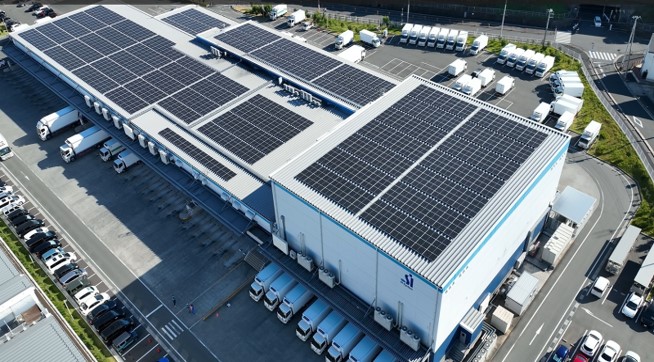
Solar panels installed on a distribution center
Collaboration and joint research:
| Name | Status of Participation | Remarks |
|---|---|---|
|
Japan Business Federation |
We support the “Challenge Zero” initiative toward carbon neutrality by 2050. |
|
|
Task Force on Climate-related Financial Disclosures (TCFD) Consortium |
We have expressed our support for the recommendations of the Task Force on Climate-related Financial Disclosures (TCFD). In addition, we are committed to our participation in the TCFD Consortium, which was established to promote joint initiatives by Japanese companies and financial institutions that support the recommendations of the TCFD. We are considering ways to improve information disclosure and engage in dialogue with stakeholders. |
|
|
RE100 |
In order to meet the CO2 emission reduction target which constitutes one of the key themes of our environmental declaration “GREEN CHALLENGE 2050”, we are participating in RE100, an international initiative that aims to use 100% renewable energy for the electricity used in our business activities. |
|
| Japan Climate Initiative: JCI |
We are committed to supporting and participating in the goals of this initiative, “joining the front line of the global push for decarbonization from Japan.” As part of our activities, we endorse the following policy recommendations. ・Renewable energy power target to 40-50% in FY2030 (January 2021) (in Japanese) |
|
| Japan Climate Leaders Partnership (JCLP) |
We agree with and support the idea that industry should have a healthy sense of crisis and start taking proactive initiatives in order to realize a sustainable decarbonized society. We were recognized as a regular member in April 2025, and our Executive Officer and Sustainability Development Office Manager is actively involved in JCLP activities as a director. We endorse the following policy recommendations. |
|
|
Japan Clean Ocean Material Alliance (CLOMA) |
We have set targets for countermeasures to plastic in our environmental declaration "GREEN CHALLENGE 2050," and our participation is grounded in our conviction that it is necessary to promote joint public-private initiatives toward the resolution of the issue of marine plastics. |
|
|
Kyoto Beyond SDGs consortiums, Kyoto University |
We are committed to participation in the consortium's initiatives toward resource recycling, energy conservation, and energy creation, as well as initiatives aimed at implementing the SDGs in local communities. Our participation is grounded in our conviction that the initiatives are aligned with the society we are aiming for and can contribute to the creation of an SDGs community in Kyoto City. |
|
|
Sustainable Future Society Creation Platform, Tokyo University |
|
This platform pursues the creation of a sustainable society mainly from the perspective of energy systems. The platform contributes to the reduction of CO2 emissions and the construction of a sustainable society, which is the goal of the environmental declaration "GREEN CHALLENGE 2050.” |
|
SBTN Corporate Engagement Program |
The SBTN is a collaborative organization of non-profit organizations and businesses that develops and provides methods and resources for setting science-based targets for a sustainable global system based on the activities of the SBT initiative. The SBTN Corporate Engagement Program aims to work with a number of partners, including businesses, to develop a scientific approach to setting targets for the use of natural capital by businesses. |
|
|
30by30 Alliance for Biodiversity |
Hosted by the Ministry of the Environment, this is an alliance that aims to achieve the goal of effectively conserving more than 30% of the land and sea as healthy ecosystems by 2030, with the goal of becoming nature-positive by 2030. |

